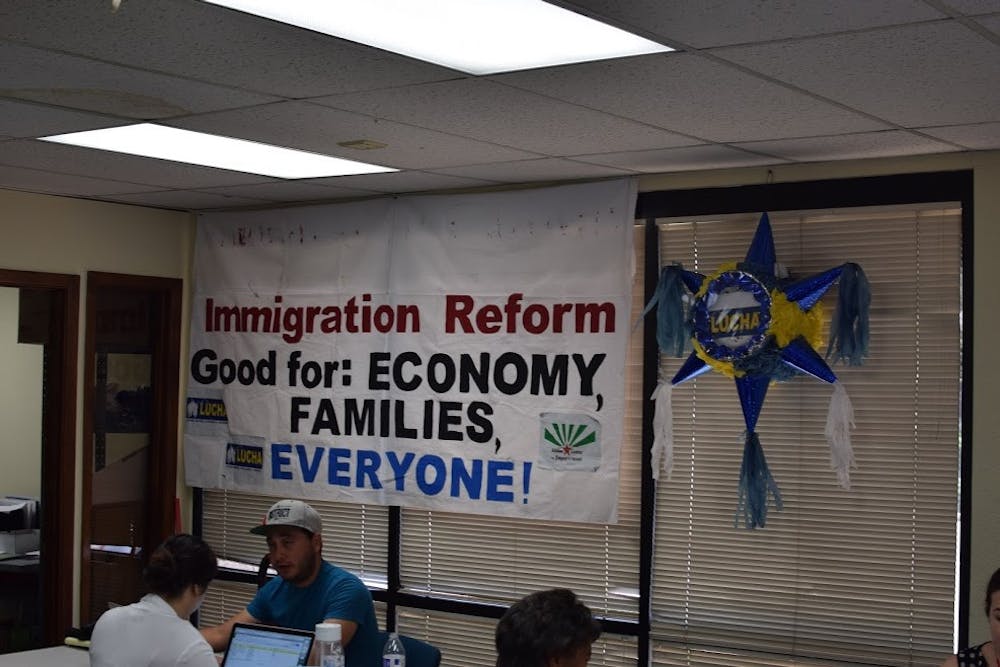A proposition to raise Arizona's minimum wage by almost $4 over four years is likely to appear on the November ballot, once again calling into question what qualifies as a living wage.
The measure comes amidst the passage of multiple minimum wage bills across the country, including propositions in New York, Washington D.C. and California to raise the state minimum wage to $15 over the next few years.
The Arizona Minimum Wage and Paid Time Off Initiative, sponsored by Arizonans for Fair Wages and Healthy Families, received almost twice the 150,000 signatures it needed to be placed on the November ballot.
The measure would raise the state's minimum hourly wage, which currently sits at $8.05, to $10 by 2017, with a fifty-cent increase every year until the beginning of 2020, when the wage would be raised to $12.
The bill would also require businesses that employ more than 15 people to offer those employees one hour of paid sick leave for every 30 hours worked.
"This proposition would help one million Arizonans," said Cesareo Chabira, a community organizer with Living United for Change in Arizona, a major proponent of the bill.
He said the campaign is as much about equality as it is a wage increase.
"Sixty-two percent of people living on minimum wage are people of color. Seventy percent are women," he said.
Chabira said the first phase of the campaign — gathering signatures, canvassing neighborhoods and going to businesses — was an invariable success. Now, his organization turns to the second phase, which entails identifying likely "yes" voters and convincing the rest to change their tune.
Students and young people, many of whom work minimum wage jobs, and many of whom tend to support progressive legislation such as this, are a key target demographic for the campaign.
"Before, minimum wage job could help people afford rent and college," Chabira said. "Now, it won't come even close. It's a really big conflict of deciding whether you're going to work or going to study."
Tuition increases have outpaced inflation for multiple decades, and a student without outside financial support would need to work 48 hours a week on the national minimum wage to afford average tuition, according to a study in the Atlantic magazine.
The measure has received pushback from many small businesses and commerce groups, including the Greater Phoenix Chamber of Commerce and the Arizona Chamber of Commerce, who claim that an increased minimum wage would harm businesses and force employers to lay off workers and raise prices.
“This initiative is bad for Arizona," wrote Garrick Taylor, Vice President of Government Relations and Communications at the Arizona Chamber of Commerce in a prepared statement. "If it passes, the very people the proposition’s organized labor supporters claim to want to help will be the most harmed. The poor, young people and those with few skills who would benefit most from an entry-level job will find themselves shut out of the job market as employers will have fewer dollars to devote to new hires."
Taylor or another representative from the Chamber could not be reached for comment.
However, proponents of the bill dispute these claims.
"If the minimum wage goes up, that pushes all wages up," said Angela Romero Ramirez, another community organizer with LUCHA. "And, if we have more money in our pockets, we can invest more in small businesses. Plus, minimum wage is not just for high schoolers. It's changing, and people need to accept that."
In fact, Romero claims that more than 60 percent of small business support the initiative, and said that business owners want better conditions for their workers as much as anyone. She concedes that an increased wage would also likely increase inflation, but said that moderate inflation would in fact benefit the local economy.
That said, the issue is unsurprisingly more complex than either side makes it out to be, said Lee McPheters, a research professor of economics at Arizona State University and the director of the school's JP Morgan Chase Economic Outlook Center.
"If you raise wages, prices are going to go up," he said. "But in a way, we're already paying those prices in taxes for public programs to help those targeted by the initiative. Some of your taxes go to buy food stamps and medical care for low-wage workers."
He said that if those workers were able to get off public programs, the extra cost would be paid by those who use the businesses that pay increased wages, rather than by a general taxpaying populace that may not frequent a certain business.
On the other hand, he said it makes more sense for wages to be indexed to inflation and not relative to a certain political climate. A minimum hourly wage set to those standards would sit around $10, he said.
Moreover, McPheters said that decreasing unemployment levels should have more to do with wages than legislation. As the rate decreases, a shortage of workers will begin, driving employers to increase wages and working conditions to compete for workers.
And, as for the argument to abolish the minimum wage entirely, often espoused by opponents of minimum wage increases and certain economists, McPheters said it would make sense in a solely market-driven economy, but not in America's economy.
"The reality is, we do not have a pure market economy, and there are regulations that affect costs of business, including not only wages but product safety, emissions and so on," he said. "So if we are to have a minimum wage set by politicians then it should be analyzed from time to time and adjusted as necessary, and that is what the ballot initiative seeks to do."




